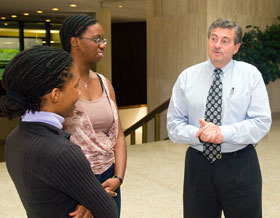  |
| HOME | THIS ISSUE | CALENDAR | GRANTS | BACK ISSUES | < BACK | NEXT > |
Medical School administrator helps students find balance, achieve successby Kristina Goodnough - September 11, 2006 |
||||
| Dr. Anthony (Bud) Ardolino, associate dean for medical student affairs, thinks he has the best job at the medical school. It's not hard to understand why he feels this way. The students are smart, highly motivated, and hard working - or they wouldn't be there. "We don't select anybody who can't handle the academic work," says Ardolino, who is a non-voting member of the Admissions Committee that reviews and decides upon student applications. "In our admissions process, we look well beyond grades and intelligence," he says. "We select high-achieving people with compassion, and then I try to help them balance their lives while they're here. It's the best job in the building." Ardolino was appointed to the position a year and a half ago, when Dr. Anthony Voytovich retired after more than a dozen years as associate dean. It's hardly a job he envisioned for himself while going through medical school. "I thought I'd be involved in research," says Ardolino. Instead, he found he preferred patients to scientific inquiry, and wound up with a residency in internal medicine at St. Francis Hospital and Medical Center. "I was supposed to go into practice with a gentleman who got sick and left medicine, so I didn't have a job," he says. "St. Francis needed an interim director for the internal medicine residency clinic. I took the position and found I loved teaching." For years, Ardolino has taught courses on the principles of clinical medicine and problem-based learning, along with health law and ethics seminars. He was also medical director for the Clinical Skills Assessment Program that monitors and evaluates student performance, and was a preceptor, teaching students in his medical office. Ardolino continues to see patients one-half day a week in the private practice of his wife, Dr. Sally Ardolino, also an internist. As associate dean, about a quarter of his time is devoted to preparing detailed evaluations of each soon-to-graduate medical student, summarizing their performance and accomplishments, to accompany their applications for postgraduate programs. "That's 80 students, with eight pages and about six drafts each," he says. "It's my main focus from August to November." M.D./Ph.D. student Marissa Caudill says, "The dean for student affairs represents the interests of the students and writes our letters for residency applications, so he has personal significance for every medical student. Bud has that special charisma and warmth that makes him perfect for such a role."
Fourth-year medical student Hugh Blumenfeld says Ardolino is an "unconditional advocate for students," who passionately believes in the program. "He also invites our help and advice." The result is a sense that anything can be worked out in a collegial atmosphere of real give-and-take. Where there have been problems, he's turned them into opportunities - like when he invited the entire first-year class to his house after a few snafus early in the fall term. It became a forum for all kinds of student-generated ideas. "I think a lot of people thought it would be impossible to fill Dr. Voytovich's shoes, including Dr. Ardolino himself," Blumenfeld adds. "So he slipped on another pair, and they fit just fine." Ardolino says the job is about getting students the help they need. Occasionally, he reaches out proactively, drawing in students on the verge of getting into difficulty. "Some students demonstrate a lack of confidence," he says. "We talk about more positive ways of speaking, about the importance of looking people in the eyes. Other students tend to question authority. "That's a trait I can relate to," he says, "but I suggest to them that the first days of a rotation are too hectic for constant questions. It might be better to curtail them for a while. "For highly competitive students, the medical school's pass/fail grading system can require some adjustment," he says. "I tell them their job is no longer to compete with each other, but with their own potential. "We don't tell students on their first day to look closely at the classmate to the left and right, because one will not be at graduation, Ardolino adds. "We say, 'Look to the left and see a family doctor, and look to the right and see a future surgeon.' We want them to understand it is now their job to help both achieve excellence."
|
| ADVANCE HOME UCONN HOME |

